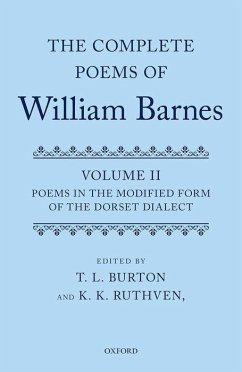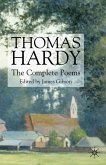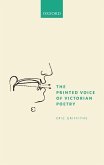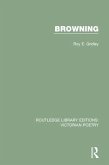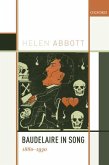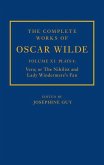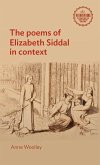K K Ruthven
Complete Poems of William Barnes
Volume 2: Poems in the Modified Form of the Dorset Dialect
Herausgeber: Burton, T L
K K Ruthven
Complete Poems of William Barnes
Volume 2: Poems in the Modified Form of the Dorset Dialect
Herausgeber: Burton, T L
- Gebundenes Buch
- Merkliste
- Auf die Merkliste
- Bewerten Bewerten
- Teilen
- Produkt teilen
- Produkterinnerung
- Produkterinnerung
The second of a three-volume edition of the complete poetry of nineteenth-century dialect poet William Barnes, this volume contains complete texts of all his surviving poems written in the modified form of the Dorset dialect that he used from the mid 1850s onwards.
Andere Kunden interessierten sich auch für
![Thomas Hardy: The Complete Poems Thomas Hardy: The Complete Poems]() T HardyThomas Hardy: The Complete Poems64,99 €
T HardyThomas Hardy: The Complete Poems64,99 €![The Printed Voice of Victorian Poetry The Printed Voice of Victorian Poetry]() Eric GriffithsThe Printed Voice of Victorian Poetry110,99 €
Eric GriffithsThe Printed Voice of Victorian Poetry110,99 €![Browning Browning]() Roy E GridleyBrowning179,99 €
Roy E GridleyBrowning179,99 €![Baudelaire in Song Baudelaire in Song]() Helen AbbottBaudelaire in Song117,99 €
Helen AbbottBaudelaire in Song117,99 €![The Complete Works of Oscar Wilde: Volume XI Plays 4: Vera; Or the Nihilist and Lady Windermere's Fan The Complete Works of Oscar Wilde: Volume XI Plays 4: Vera; Or the Nihilist and Lady Windermere's Fan]() Josephine M GuyThe Complete Works of Oscar Wilde: Volume XI Plays 4: Vera; Or the Nihilist and Lady Windermere's Fan270,99 €
Josephine M GuyThe Complete Works of Oscar Wilde: Volume XI Plays 4: Vera; Or the Nihilist and Lady Windermere's Fan270,99 €![Lady Gregory's Early Irish Writings, 1883-1893 Lady Gregory's Early Irish Writings, 1883-1893]() Lady Gregory's Early Irish Writings, 1883-189395,99 €
Lady Gregory's Early Irish Writings, 1883-189395,99 €![The poems of Elizabeth Siddal in context The poems of Elizabeth Siddal in context]() Anne WoolleyThe poems of Elizabeth Siddal in context121,99 €
Anne WoolleyThe poems of Elizabeth Siddal in context121,99 €-
-
-
The second of a three-volume edition of the complete poetry of nineteenth-century dialect poet William Barnes, this volume contains complete texts of all his surviving poems written in the modified form of the Dorset dialect that he used from the mid 1850s onwards.
Produktdetails
- Produktdetails
- Verlag: Oxford University Press, USA
- Seitenzahl: 848
- Erscheinungstermin: 14. August 2018
- Englisch
- Abmessung: 236mm x 160mm x 51mm
- Gewicht: 1338g
- ISBN-13: 9780199567539
- ISBN-10: 0199567530
- Artikelnr.: 50761406
- Verlag: Oxford University Press, USA
- Seitenzahl: 848
- Erscheinungstermin: 14. August 2018
- Englisch
- Abmessung: 236mm x 160mm x 51mm
- Gewicht: 1338g
- ISBN-13: 9780199567539
- ISBN-10: 0199567530
- Artikelnr.: 50761406
T. L. Burton, Emeritus Professor in the Department of English and Creative Writing at the University of Adelaide, K. K. Ruthven, Emeritus Professor of English and Cultural Studies at the University of Melbourne and a Visiting Professor in the School of Humanities at the University of Adelaide Tom Burton is an Emeritus Professor of English at the University of Adelaide. He grew up on a farm in Shropshire; studied English at the University of Bristol; and taught for three years in secondary schools in East Africa and England before emigrating to Australia in 1974. He has edited a popular book of knowledge in 15th-century English verse, Sidrak and Bokkus, for the Early English Text Society, and has written two books for the general public on changing English, Words, Words, Words and Words in Your Ear (republished in one volume in the UK as Long Words Bother Me). He has given talks on Barnes's poetry at many universities in the UK and USA and is a frequent speaker to literary societies, writing circles, U3A groups, and on radio. His William Barnes's Dialect Poems: A Pronunciation Guide was published in 2010, and his series on 'The Sound of William Barnes's Dialect Poems' is freely accessible online through the University of Adelaide Press. K.K. Ruthven was educated at the University of Manchester, and became a Professor of English at the universities of Canterbury (New Zealand), Adelaide, and Melbourne. At Adelaide he edited Southern Review (1981-85), and at Melbourne a monograph series of introductions to recent theories and critical practices in the humanities and social sciences (19 vols, 1993-96). From 1983 until 2002, he was a Fellow of the Australian Academy of the Humanities, for which he organised a conference on new developments in the humanities, papers from which he edited as Beyond the Disciplines: The New Humanities (1992).
* List of Illustrations
* List of Abbreviations
* General Introduction
* Textual Introduction
* I: Poems in the Second Collection of Poems of Rural Life in the
Dorset Dialect (Hwomely Rhymes, 1859) as Revised for the Final
Collection (1879)
* II: (ii) Uncollected Poems Published in 1859
* III: (iii) The Song of Solomon in The Dorset Dialect From the
Authorised English Version (1859)
* IV: (iv) Poems in the Third Collection of Poems of Rural Life in the
Dorset Dialect (1862) as Revised for the Final Collection (1879)
* V: Poems in the First Collection of Poems of Rural Life in the Dorset
Dialect (1844) as Re-Written in the Modified Form of the Dialect for
the Third Edition (1862) and Subsequently Revised for the Final
Collection (1879)
* VI: Poems Composed in the Broad Form of the Dialect but Excluded from
the First Collection of Poems of Rural Life in the Dorset Dialect
(1844) as Subsequently Re-Written in the Modified Form of the Dialect
* VII: Uncollected Poems Published in 1864-1868
* VIII: Manuscript Poems Composed before 1868 and Published
Posthumously
* IX: Manuscript Poems Composed after 1868 and Published Posthumously
* X: Last Published Poems 1883-1886
* Notes on the Poems
* Appendices
* References
* Glossary
* Glossary of Place-Names Occurring in the Poems
* Index of Titles and First Lines
* List of Abbreviations
* General Introduction
* Textual Introduction
* I: Poems in the Second Collection of Poems of Rural Life in the
Dorset Dialect (Hwomely Rhymes, 1859) as Revised for the Final
Collection (1879)
* II: (ii) Uncollected Poems Published in 1859
* III: (iii) The Song of Solomon in The Dorset Dialect From the
Authorised English Version (1859)
* IV: (iv) Poems in the Third Collection of Poems of Rural Life in the
Dorset Dialect (1862) as Revised for the Final Collection (1879)
* V: Poems in the First Collection of Poems of Rural Life in the Dorset
Dialect (1844) as Re-Written in the Modified Form of the Dialect for
the Third Edition (1862) and Subsequently Revised for the Final
Collection (1879)
* VI: Poems Composed in the Broad Form of the Dialect but Excluded from
the First Collection of Poems of Rural Life in the Dorset Dialect
(1844) as Subsequently Re-Written in the Modified Form of the Dialect
* VII: Uncollected Poems Published in 1864-1868
* VIII: Manuscript Poems Composed before 1868 and Published
Posthumously
* IX: Manuscript Poems Composed after 1868 and Published Posthumously
* X: Last Published Poems 1883-1886
* Notes on the Poems
* Appendices
* References
* Glossary
* Glossary of Place-Names Occurring in the Poems
* Index of Titles and First Lines
* List of Illustrations
* List of Abbreviations
* General Introduction
* Textual Introduction
* I: Poems in the Second Collection of Poems of Rural Life in the
Dorset Dialect (Hwomely Rhymes, 1859) as Revised for the Final
Collection (1879)
* II: (ii) Uncollected Poems Published in 1859
* III: (iii) The Song of Solomon in The Dorset Dialect From the
Authorised English Version (1859)
* IV: (iv) Poems in the Third Collection of Poems of Rural Life in the
Dorset Dialect (1862) as Revised for the Final Collection (1879)
* V: Poems in the First Collection of Poems of Rural Life in the Dorset
Dialect (1844) as Re-Written in the Modified Form of the Dialect for
the Third Edition (1862) and Subsequently Revised for the Final
Collection (1879)
* VI: Poems Composed in the Broad Form of the Dialect but Excluded from
the First Collection of Poems of Rural Life in the Dorset Dialect
(1844) as Subsequently Re-Written in the Modified Form of the Dialect
* VII: Uncollected Poems Published in 1864-1868
* VIII: Manuscript Poems Composed before 1868 and Published
Posthumously
* IX: Manuscript Poems Composed after 1868 and Published Posthumously
* X: Last Published Poems 1883-1886
* Notes on the Poems
* Appendices
* References
* Glossary
* Glossary of Place-Names Occurring in the Poems
* Index of Titles and First Lines
* List of Abbreviations
* General Introduction
* Textual Introduction
* I: Poems in the Second Collection of Poems of Rural Life in the
Dorset Dialect (Hwomely Rhymes, 1859) as Revised for the Final
Collection (1879)
* II: (ii) Uncollected Poems Published in 1859
* III: (iii) The Song of Solomon in The Dorset Dialect From the
Authorised English Version (1859)
* IV: (iv) Poems in the Third Collection of Poems of Rural Life in the
Dorset Dialect (1862) as Revised for the Final Collection (1879)
* V: Poems in the First Collection of Poems of Rural Life in the Dorset
Dialect (1844) as Re-Written in the Modified Form of the Dialect for
the Third Edition (1862) and Subsequently Revised for the Final
Collection (1879)
* VI: Poems Composed in the Broad Form of the Dialect but Excluded from
the First Collection of Poems of Rural Life in the Dorset Dialect
(1844) as Subsequently Re-Written in the Modified Form of the Dialect
* VII: Uncollected Poems Published in 1864-1868
* VIII: Manuscript Poems Composed before 1868 and Published
Posthumously
* IX: Manuscript Poems Composed after 1868 and Published Posthumously
* X: Last Published Poems 1883-1886
* Notes on the Poems
* Appendices
* References
* Glossary
* Glossary of Place-Names Occurring in the Poems
* Index of Titles and First Lines

